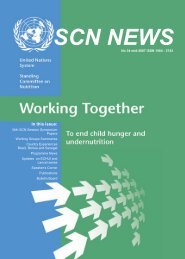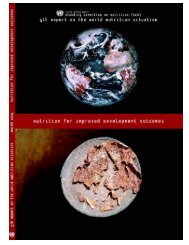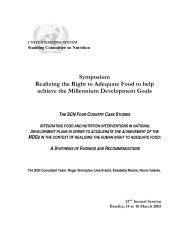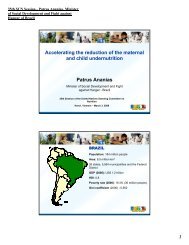Universal Salt Iodization (USI) - FTP Directory Listing
Universal Salt Iodization (USI) - FTP Directory Listing
Universal Salt Iodization (USI) - FTP Directory Listing
- No tags were found...
You also want an ePaper? Increase the reach of your titles
YUMPU automatically turns print PDFs into web optimized ePapers that Google loves.
18FEATURESwww.unsystem.org/scnShrimpton R, Macleod-Omawale J, Metz P, Belbase K (2002) UNICEF Nutrition Portfolio Review (1980-1999): Acontribution to the World Bank/UNICEF Nutrition Assessment. UNICEF:New York.Trowbridge FL, Harris SS, Cook J, Dunn JT, Florentino RF, Kodyat BA, et al. (1993) Coordinated strategies forcontrolling micronutrient malnutrition: a technical workshop. J Nutr 123: 775-87.UNICEF (1990) The World Summit for the Children. World Declaration on the Survival, Protection and Development ofChildren. UNICEF:New York. (online)UNICEF (1998) The State of the World's Children 1998 - Nutrition. UNICEF:New York. (online)UNICEF (2001) Progress since the World Summit for Children - A Statistical Review. UNICEF:New York. (online)UNICEF (2002a) A World Fit for Children. UNICEF:New York. (online)UNICEF (2002b) Sustaining <strong>Universal</strong> <strong>Salt</strong> <strong>Iodization</strong> – China. (online)UNICEF (2006) The State of the World's Children 2007. Women and Children: The Double Dividend of Gender Equality.UNICEF:New York. (online)UNICEF (2007) Progress for Children. UNICEF:New York. (online, see also announcement below)UNICEF/WHO (1994) World Summit for Children - Mid-decade goal: Iodine Deficiency Disorders. In Joint Committee onHealth Policy. UNICEF/WHO:Geneva.Wang J, Harris M, Amos B, Li M, Wang X, Zhang J, Chen J (1997) A ten year review of the iodine deficiency disordersprogram of the People's Republic of China. J Public Health Policy 18: 219-41.WHO (1996) Recommended iodine levels in salt and guidelines for monitoring their adequacy and effectiveness.WHO:Geneva. (online)WHO (2004) Iodine Status Worldwide: WHO Global Database on Iodine Deficiency. WHO:Geneva. (online)World Bank (1994) Enriching Lives: Overcoming Vitamin and Mineral Malnutrition in Developing Countries. WorldBank:Washington DC. (online)Zimmermann MB (2004) Assessing iodine status and monitoring progress of iodized salt programs. J Nutr 134: 1673-7.Contact: wschultink@unicef.orgANNOUNCEMENT: just released:PROGRESS FOR CHILDRENA World Fit for Children Statistical ReviewUNICEF December 2007This special issue of Progress for Children analysesprogress at global, regional and country levels, and ithighlights disparities within populations. The publicationextends and develops the 2000 statistical reviewof progress since the World Summit for Children in1990 and is a major effort to gather and analyse informationon how well world leaders have kept theirpromises to children. This statistical review is structuredaround the MillenniumDevelopment Goals because these are currently thefocus of the world’s development efforts. Many of theWorld Fit for Children targets set at the Special Sessionare effectively stepping stones towards the2015 MDGs, and governments will henceforth concentrateprimarily on their MDG commitments. TheWorld Fit for Children agenda includes vital issuesfor children not covered by the MDGs, and this publication represents a unique opportunity to report on theseconcerns. Progress for Children is a statistical publication. But each statistic represents the lives of individualchildren, many of them blighted by ill-treatment or a lack of opportunity. Behind every one of these statisticalassessments is a vision of a world in which children are healthy and reach their full potential, in which theyare protected from disease and abuse – a world in which children’s rights across the board are fully realized.SCN NEWS # 35 back to contents







